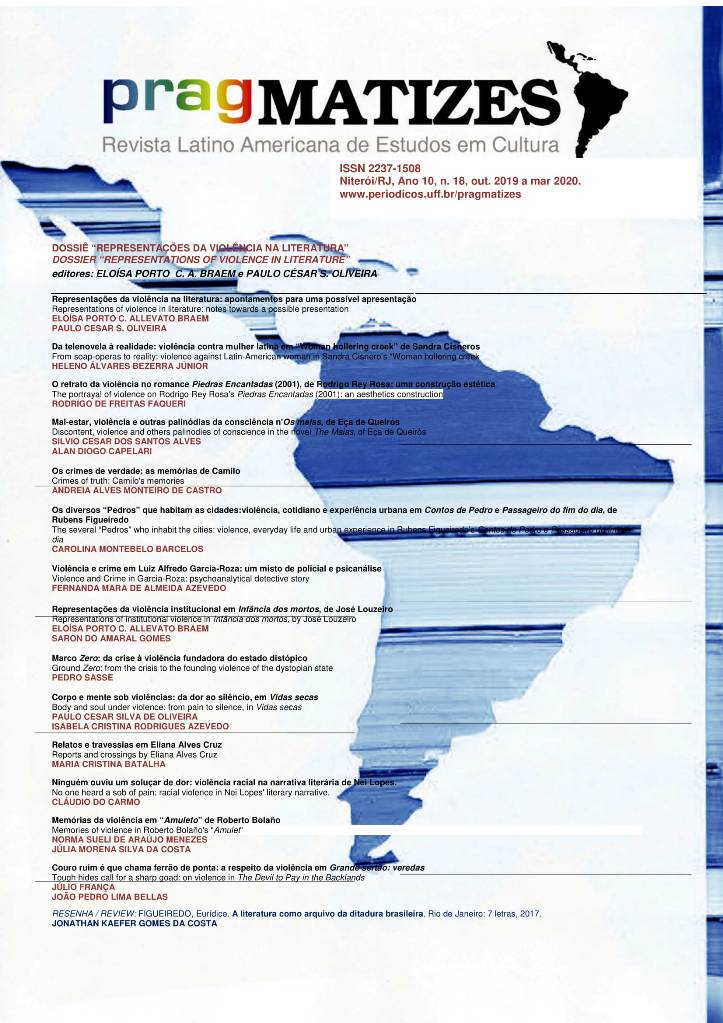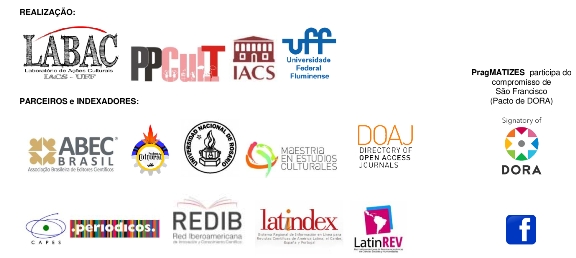Memories of violence in Roberto Bolaño's “Amulet”
DOI:
https://doi.org/10.22409/pragmatizes.v10i18.40211Keywords:
literature, violence, politics, vanguard, canonAbstract
This essay aims to present an analysis of the violence present in the book “Amuleto” by the Chilean writer Roberto Bolaño. The novel portrays the early 1960s, a time of great political tensions and significant violence in Mexico and the beginning of the Chilean military-business dictatorship (1973-1990). Dictatorial regimes, although in different circumstances, were (and still are) landmark episodes that unite Latin American countries. We will identify the various forms of violence that occurred in Latin America, specifically in Chile and Mexico during the period mentioned, as well as, what is the relationship between politics and literature present in that work. The current political discourses circulating in our society indicate that a large part of the Brazilian population probably ignores a significant part of history, including Brazil, in the 1960s / 1970s, that is the memory produced about this period failed to make known the horrors and the atrocities committed during the more than 20 years of military rule in the country. Based on the approach of the place of poetry and poets in the 1970s, Amuleto's narrator talks about her role as a defender of poetry and the political memory of Mexico and Chile of the mid-20th century, inseparable. With his circular speech, based on the reiteration of traumatic events that witnessed, in particular, the invasion of UNAM, the Tlatelolco Massacre (1968) and the Chilean military coup (1973). In this last fact, reported by the character Arturo Belano, there is a work of memorialistic excavation, both in the historical events mentioned, as well as the poetic intentions of the Mexican federal district. The young poets narrated by the protagonist defended the free transit between life and poetry, opposed the current academic patterns embodied in the figure of Octavio Paz, as well as hegemonic power. The poetic movement of these young Latin Americans in the 1970s adds to the many concerns of their members. The passion for poetry is the basic principle that gives unity to the group that sought in each act and in each verse a new way of explaining the world through poetry without bureaucracy, without spaces of power and standardized legitimations. This study contributes to the indispensability of keeping alive the horrors and traumas that happened during the authoritarian regimes and the military dictatorships in Latin America and its reverberations, considering, above all, that memory can be a powerful instrument used in the reconstruction of history. Theoretical and critical texts by Paul Ricoeur (1996), Nascimento (2008), Seligmann-Silva (2003), Sarlo (2007), Rojo (2012), Bolognese (2009), Villarreal (2011), among others, will be used. This essay aims to present an analysis of the violence present in the book “Amuleto” by the Chilean writer Roberto Bolaño. The novel portrays the early 1960s, a time of great political tensions and significant violence in Mexico and the beginning of the Chilean military-business dictatorship (1973-1990). Dictatorial regimes, although in different circumstances, were (and still are) landmark episodes that unite Latin American countries. We will identify the various forms of violence that occurred in Latin America, specifically in Chile and Mexico during the period mentioned, as well as, what is the relationship between politics and literature present in that work. The current political discourses circulating in our society indicate that a large part of the Brazilian population probably ignores a significant part of history, including Brazil, in the 1960s / 1970s, that is the memory produced about this period failed to make known the horrors and the atrocities committed during the more than 20 years of military rule in the country. Based on the approach of the place of poetry and poets in the 1970s, Amuleto's narrator talks about her role as a defender of poetry and the political memory of Mexico and Chile of the mid-20th century, inseparable. With his circular speech, based on the reiteration of traumatic events that witnessed, in particular, the invasion of UNAM, the Tlatelolco Massacre (1968) and the Chilean military coup (1973). In this last fact, reported by the character Arturo Belano, there is a work of memorialistic excavation, both in the historical events mentioned, as well as the poetic intentions of the Mexican federal district. The young poets narrated by the protagonist defended the free transit between life and poetry, opposed the current academic patterns embodied in the figure of Octavio Paz, as well as hegemonic power. The poetic movement of these young Latin Americans in the 1970s adds to the many concerns of their members. The passion for poetry is the basic principle that gives unity to the group that sought in each act and in each verse a new way of explaining the world through poetry without bureaucracy, without spaces of power and standardized legitimations. This study contributes to the indispensability of keeping alive the horrors and traumas that happened during the authoritarian regimes and the military dictatorships in Latin America and its reverberations, considering, above all, that memory can be a powerful instrument used in the reconstruction of history. Theoretical and critical texts by Paul Ricoeur (1996), Nascimento (2008), Seligmann-Silva (2003), Sarlo (2007), Rojo (2012), Bolognese (2009), Villarreal (2011), among others, will be used.Downloads
References
BOLAÑO, Roberto. Déjenlo todo nuevamente. Manifesto Infrarrealista. 1976. Disponível em: Acesso em: 3 dez 2016.
_______. Amuleto. Barcelona. Editorial Anagrama, 1999.
BOLOGNESE, Chiara. Roberto Bolaño y sus comienzos literarios: El infrarrealismo entre realidad y ficción. Acta literária, n. 39, 2009, pp. 131-140. Disponível em: <http://www.scielo.cl/scielo.php?script=sci_arttext&pid=S071768482009000200010>. Acesso em: 12 fev 2019.
BRAITHWAITE, Andrés. Bolaño por sí mismo: entrevistas escogidas. Chile: Ediciones Universidad Diego Portales, 2006.
CARRAL, Andrea Cobas. Déjenlo todo nuevamente: apuntes sobre el movimiento infrarrealista mexicano. 2005. Disponível em: <http://letras.s5.com.istemp.com/rb051105.htm>. Acesso em: 21 mai 2019.
CARO, Montserrat Madariaga. Bolaño Infra 1975 – 1977: los años que inspiraron Los detectives salvajes. Santiago: RIL editores, 2010.
ESTRADA, Ramón. Déjenlo todo nuevamente. Manifesto Infrarrealista. 1976. Disponível em:. Acesso em: 03 dez 2019.
MEDINA, Rubén. Documentário sobre a obra e vida de Bolaño. Semana de autor, Roberto Bolaño entorno y retorno. Disponível em: <https://www.youtube.com/watch?v=NuS-7Oml4FE>. Acesso em: 28 ago 2019.
NASCIMENTO, Evando. Retrato desnatural (diários – 2004 a 2007). Rio de Janeiro: Record. 2008.
PAZ, Octavio. Revolução. Eros. Metaironis. In: ___. Os filhos do Barro. Trad. Ari Roitman e Paulina Wacht. São Paulo: Cosacnaify. Fondo de Cultura Económica, 2014.
PAZ SOLDÁN, Edmundo; FAVERÓN Patriau, G. Bolaño Salvaje. 6ª ed. España: Editorial Candaya, 2013.
RICOEUR, Paul. A memória, a história, o esquecimento. Campinas: Editora da Unicamp, 1996.
ROJO, Grínor. De las más altas cumbres. Teoria Crítica latinoamericana moderna. LOM Ediciones. 1 ed. 2012.
SARLO, Beatriz. Tempo passado: cultura da memória e guinada subjetiva. Companhia das letras, 2007.
_____. O terror e a memória num beco sem saída. O Estado de S. Paulo, São Paulo, 01 abr. 2007. Caderno Cultura. Disponível em:<http://observatoriodaimprensa.com.br/interesse-publico/o-estado-de-s-paulo-33438/>. Acesso em: 05 jul 2019.
VILLARREAL, Rogelio. El gran rechazo: underground y contracultura. Revista Replicante. Nov. 2011. Disponível em: <http://revistareplicante.com/destacados/elgran-rechazo/>. Acesso em: 02 abr 2019.
Downloads
Published
How to Cite
Issue
Section
License
By forwarding an original to PragMATIZES, the authors agree that the copyright related to it is transferred to the Publishing. Articles and other writings are made available in PDF format from their publication, and they can be downloaded to institutional repositories and personal pages, provided that with their proper bibliographic indication.



